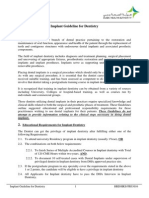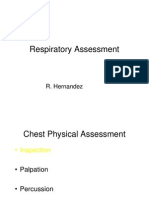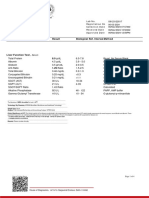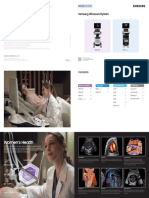Guidelines 1
Guidelines 1
Uploaded by
Rajah KanoCopyright:
Available Formats
Guidelines 1
Guidelines 1
Uploaded by
Rajah KanoOriginal Description:
Copyright
Available Formats
Share this document
Did you find this document useful?
Is this content inappropriate?
Copyright:
Available Formats
Guidelines 1
Guidelines 1
Uploaded by
Rajah KanoCopyright:
Available Formats
ACC Dental Implant Guidelines
Introduction
These guidelines set out the criteria that must be met for ACC to consider contributing towards the cost of dental implants. The criteria were developed by ACC, in consultation with the New Zealand Dental Association. Please note that: claims decisions will be based on the clients oral status at the time of injury (remediation of preexisting, unmet treatment needs or other conditions that prevent the claimant from satisfying the eligibility criteria for dental implants will not improve or change their eligibility) if these criteria are met, there are other factors that we take into account before approving a claim, and clients should be told this (the other factors we must consider are summarised below under Summary of terms of ACC funding for dental implants).
Age and general health
The client must be at least 21 years old. The client must be generally fit and healthy, and not be: undergoing any of the following treatment: long-term steroid therapy; radiation therapy to a potential implant site; chemotherapy; haemodialysis; heart surgery (within the last six months) taking anticoagulants or medication that contraindicates implant success, eg bisphosphonates a smoker of more than 10 cigarettes per day.
The client must not be suffering from metabolic disorders, chronic nephritis or a severe systemic disease (including leukaemia and collagen disorders such as systemic lupus erythematosis and scleroderma). The client must have no adverse psychological or behaviour patterns. The client must not be pregnant. If the client has insulin-dependent or non-insulin dependent diabetes, their HbA1c must have been stable and in the 6-7% range or 4253 mmol/mol over the last 12 months.
Dental health and history
The client must have generally healthy, well maintained and stable dentition. The client must have healthy, well maintained supporting tissues. There should be no significant periodontal disease. If there is evidence of periodontal bone loss, you must supply a five-year history of periodontal maintenance demonstrating the stability of the periodontal condition. The client should have a five-year, auditable history of regular dental check-ups and preventative dental care, which is suggestive of their ability and commitment to manage their ongoing dental maintenance and oral health (ACC will consider applications without this fiveyear dental history, as long as all other criteria are met).
The client must have a continuous maxillary and mandibular dentition, with no other un-filled edentulous spaces from first molar to first molar (an existing fixed bridge; missing 7s and 8s; teeth extracted as part of comprehensive orthodontic treatment; or congenitally missing teeth are acceptable). If the client does have a pre-existing edentulous space but the rest of their mouth meets this criterion, they can choose to have an implant before seeking an ACC-funded implant. Please note that ACC will only consider funding an implant for a 7s if all other second molars are present and in good condition. The client must have no dental habits or oral conditions that preclude the placement of implants, such as: bruxism poor oral hygiene habits severe ulceration or erosive lesions temporomandibular joint disorder history of facial fractures (which may preclude the placement of implants, at least in the immediate future).
Positive indicators of successful, long-term treatment
The client must be able to cope with the process of implant treatment, and must be capable of looking after their implant(s) and restoration(s) satisfactorily. The implant(s) and the existing dentition from first molar to first molar must be expected to survive for more than 15 years. The remaining teeth from first molar to first molar in both arches must be in such a condition that they will remain intact for a similar expected life of an implant.
Unrealistic expectations regarding treatment
The client should not have extreme and unrealistic expectations of the aesthetic and/or functional result of treatment.
Summary of terms of ACC funding for dental implants
ACC is liable to contribute towards implant treatment if its for the purpose of restoring the clients health to the maximum extent practicable, and the treatment: is necessary and appropriate has been or will be performed only on the number of occasions necessary has been or will be given at an appropriate time or place is of a type normally provided by the treatment provider is provided by a treatment provider of a type whos qualified to provide that treatment and who normally provides that treatment is provided after ACC agrees to the treatment. the nature and severity of the injury the generally accepted means of treatment for such an injury in New Zealand the other options available in New Zealand for the treatment of such an injury the cost in New Zealand of the generally accepted means of treatment and the other options, compared with the benefit that the client is likely to receive from the treatment.
When deciding if we can approve a clients treatment, ACC must take into account:
ACC2458 Printed November 2010
You might also like
- Orthodontic Contract and Consent Form PDFDocument6 pagesOrthodontic Contract and Consent Form PDFjack100% (1)
- Go Smile Dental Clinic - Pcpi ProposalDocument4 pagesGo Smile Dental Clinic - Pcpi ProposalRosette GoNo ratings yet
- Key Points From Busting Loose From The Money GameDocument6 pagesKey Points From Busting Loose From The Money GameRajah Kano100% (7)
- The Complete Guide to Dental Implants: All About DentistryFrom EverandThe Complete Guide to Dental Implants: All About DentistryNo ratings yet
- Medical Coding For Dental PracticesDocument15 pagesMedical Coding For Dental Practicesghassan ahmedNo ratings yet
- Informed Consent For Porcelain VeneersDocument2 pagesInformed Consent For Porcelain VeneersEking In100% (1)
- Dental Implant Treatment Planning for New Dentists Starting Implant TherapyFrom EverandDental Implant Treatment Planning for New Dentists Starting Implant TherapyRating: 4 out of 5 stars4/5 (1)
- GDC Training Standards in Implant DentistryDocument9 pagesGDC Training Standards in Implant Dentistrylg_1234No ratings yet
- Dental Form DD 2813Document1 pageDental Form DD 2813Harvey A TolleyNo ratings yet
- Diagnosis and Treatment Planning For Partially Edentulous Patients11Document160 pagesDiagnosis and Treatment Planning For Partially Edentulous Patients11Rajsandeep Singh80% (5)
- Oxygen TherapyDocument7 pagesOxygen TherapySudhir TyagiNo ratings yet
- Consent For Complete DenturesDocument3 pagesConsent For Complete DenturesArchanaShenoyNo ratings yet
- Training Standards in Implant Dentistry 2016Document13 pagesTraining Standards in Implant Dentistry 2016Ramona RochianNo ratings yet
- FCD Ethical and Legal IssuesDocument6 pagesFCD Ethical and Legal Issuesnicholas51292No ratings yet
- English Free Whitening For Life Contract v2Document2 pagesEnglish Free Whitening For Life Contract v2api-295067164No ratings yet
- Tooth ExtractionDocument9 pagesTooth ExtractionChandraPrakaash100% (2)
- 2014 Passive DPPO Benefits Summary FinalDocument4 pages2014 Passive DPPO Benefits Summary FinalsamypalNo ratings yet
- Waterpik Treatment Planning For Implant Dentistry ContinuingEducationDocument12 pagesWaterpik Treatment Planning For Implant Dentistry ContinuingEducationGreen Sleeves100% (1)
- Dental Blue Program 2: (With Orthodontics)Document5 pagesDental Blue Program 2: (With Orthodontics)Cande ArNo ratings yet
- Dental Implant ConsentDocument3 pagesDental Implant ConsentSonia shitoleNo ratings yet
- BlueDental Copayment QF Plan BrochureDocument4 pagesBlueDental Copayment QF Plan BrochureJoshua JohnsonNo ratings yet
- Specialty Tip #18 Oral & MaxillofacialDocument6 pagesSpecialty Tip #18 Oral & MaxillofacialromzikerenzNo ratings yet
- RCDSO Guidelines Implant Dentistry PDFDocument16 pagesRCDSO Guidelines Implant Dentistry PDFl4j0b9100% (1)
- CD Dental Implant Consent Form PDFDocument3 pagesCD Dental Implant Consent Form PDFMuaiyed Buzayan AkremyNo ratings yet
- Section One - Fundamentals of Implant Dentistry: Chapter 1 - How To Recognize A Mainstream CaseDocument6 pagesSection One - Fundamentals of Implant Dentistry: Chapter 1 - How To Recognize A Mainstream CaseKomal TalrejaNo ratings yet
- Simplified CDDocument16 pagesSimplified CDSthithika ShettyNo ratings yet
- Chao Pinhole Surgical Technique Consent FormDocument2 pagesChao Pinhole Surgical Technique Consent FormDavidNo ratings yet
- Diagnosis: Risk Factors For Partially Edentulous PatientDocument8 pagesDiagnosis: Risk Factors For Partially Edentulous PatientnjucyNo ratings yet
- Implant-Consent (1)Document4 pagesImplant-Consent (1)yaikobderejeNo ratings yet
- Removable Prosthodontics: Instructions For UseDocument6 pagesRemovable Prosthodontics: Instructions For UseYuaninda FajarinNo ratings yet
- 620 Implant Guide WebDocument8 pages620 Implant Guide WebFabián SajamaNo ratings yet
- Six Month Smiles Consent FormDocument3 pagesSix Month Smiles Consent Formabarbel1No ratings yet
- Peace Corps Office of Medical Services Dental Technical Guideline 180 - Dental PolicyDocument8 pagesPeace Corps Office of Medical Services Dental Technical Guideline 180 - Dental PolicyAccessible Journal Media: Peace Corps DocumentsNo ratings yet
- Ecde 18 01005 PDFDocument14 pagesEcde 18 01005 PDFJawad TariqNo ratings yet
- Ortho Guidelines-2008 AAODocument43 pagesOrtho Guidelines-2008 AAOThaiHuyThanhNo ratings yet
- Oral Diagnosis and Treatment Planning: Part 8. Reviews and Maintenance of RestorationsDocument8 pagesOral Diagnosis and Treatment Planning: Part 8. Reviews and Maintenance of RestorationsBibek RajNo ratings yet
- SADJ May 2014 - Ethical Issues in Replacing A Single Tooth With A Dental ImplantDocument2 pagesSADJ May 2014 - Ethical Issues in Replacing A Single Tooth With A Dental ImplantdrjonduNo ratings yet
- (20120228110933 Am) Samwumed Benefitsbrochure2012 WebDocument16 pages(20120228110933 Am) Samwumed Benefitsbrochure2012 WebsafinditNo ratings yet
- Vinay Pavankumar .K Ii Year Pg. Student Dept of Prosthodontics Maaruti College of Dental SciencesDocument51 pagesVinay Pavankumar .K Ii Year Pg. Student Dept of Prosthodontics Maaruti College of Dental Sciencesاحمد زيد سعيدNo ratings yet
- Implant Guideline For DentistryDocument1 pageImplant Guideline For DentistryAlka Mendhe Adyalkar0% (1)
- Workshop DetailsDocument2 pagesWorkshop DetailsSurya TejaNo ratings yet
- Consent For Complete DenturesDocument2 pagesConsent For Complete DenturesPulkit Kinra100% (1)
- Introducing Dental ImplantsDocument13 pagesIntroducing Dental ImplantsKeyser SozeNo ratings yet
- Quality Indicators in OrthodonticsDocument6 pagesQuality Indicators in Orthodonticsmarryamnasir1009No ratings yet
- Periodontal Therapy StatementDocument7 pagesPeriodontal Therapy StatementDiana Alexandra100% (1)
- Oral Sugery in Medically Compromised PatientDocument11 pagesOral Sugery in Medically Compromised PatientDrdilip PathakNo ratings yet
- Policy On Third-Party Reimbursement of MedicalDocument4 pagesPolicy On Third-Party Reimbursement of MedicalمعتزباللهNo ratings yet
- DR Srivatsa G - History TakingDocument43 pagesDR Srivatsa G - History TakingSupriya ShuklaNo ratings yet
- 2021 CTP Candidate GuideDocument31 pages2021 CTP Candidate GuideXiid DNo ratings yet
- Prosthodontics Lec 2 PDFDocument25 pagesProsthodontics Lec 2 PDFHassan QazaniNo ratings yet
- Dental Deks 2014 EthicsDocument30 pagesDental Deks 2014 EthicsVladimir Argirovic67% (3)
- Nobel Biocare Treatment PlanDocument32 pagesNobel Biocare Treatment PlanSalem RawashdahNo ratings yet
- Informed Consent For Crown and Bridge ProstheticsDocument3 pagesInformed Consent For Crown and Bridge ProstheticsVikkii Veerakumar0% (1)
- Screenshot 2024-06-17 at 9.02.41 PMDocument12 pagesScreenshot 2024-06-17 at 9.02.41 PMايمن صباح عبد حماديNo ratings yet
- Diagnosis and Treatment Plan of CDDocument12 pagesDiagnosis and Treatment Plan of CDIbrahim HashimiNo ratings yet
- Diagnosis & Treatment Planning For Edentulous PatientDocument9 pagesDiagnosis & Treatment Planning For Edentulous PatientChhavi sharmaNo ratings yet
- Risk Management Oral SurgeryDocument7 pagesRisk Management Oral SurgerymohsinosmaanNo ratings yet
- Treatment Planning Single Maxillary Anterior Implants for DentistsFrom EverandTreatment Planning Single Maxillary Anterior Implants for DentistsNo ratings yet
- Treatment Planning in Restorative Dentistry and Implant ProsthodonticsFrom EverandTreatment Planning in Restorative Dentistry and Implant ProsthodonticsNo ratings yet
- Marketing Implant Dentistry: Attract and Influence Patients to Accept Your Dental Implant Treatment PlanFrom EverandMarketing Implant Dentistry: Attract and Influence Patients to Accept Your Dental Implant Treatment PlanNo ratings yet
- Sanitation and Health: Plos Medicine November 2010Document8 pagesSanitation and Health: Plos Medicine November 2010Rajah KanoNo ratings yet
- Ozone Therapy in Dentistry: A Strategic ReviewDocument3 pagesOzone Therapy in Dentistry: A Strategic ReviewRajah KanoNo ratings yet
- Being Nice Makes You Cool Ha Ha Ha Ha Ha Ha Coldy Cool Hotty HotDocument15 pagesBeing Nice Makes You Cool Ha Ha Ha Ha Ha Ha Coldy Cool Hotty HotRajah KanoNo ratings yet
- APVVP - Sanitation - Package III PDFDocument104 pagesAPVVP - Sanitation - Package III PDFRajah KanoNo ratings yet
- Andhra Pradesh - Sanitation & Housekeeping Tender's Details: Project TitleDocument2 pagesAndhra Pradesh - Sanitation & Housekeeping Tender's Details: Project TitleRajah KanoNo ratings yet
- Cement GuideDocument39 pagesCement Guideatul_singh2001No ratings yet
- 21 Ways of Raising VibeDocument3 pages21 Ways of Raising VibeRajah Kano100% (1)
- R & M IssuesDocument3 pagesR & M IssuesRajah KanoNo ratings yet
- Daily PlatterDocument3 pagesDaily PlatterRajah KanoNo ratings yet
- Clinic ConcernsDocument2 pagesClinic ConcernsRajah KanoNo ratings yet
- Created by Colin Tipping: IMAGE - ShadowDocument1 pageCreated by Colin Tipping: IMAGE - ShadowRajah Kano100% (3)
- Self Care ToolkitDocument9 pagesSelf Care ToolkitRajah Kano100% (3)
- Forgiveness Affirmation PDFDocument2 pagesForgiveness Affirmation PDFRajah Kano100% (1)
- Dental Instrument ManualDocument45 pagesDental Instrument ManualRajah Kano50% (2)
- The 3M Imprint II Monophase Impression Material System: ReliabilityDocument2 pagesThe 3M Imprint II Monophase Impression Material System: ReliabilityRajah KanoNo ratings yet
- The Arterial PulseDocument22 pagesThe Arterial PulsestudymedicNo ratings yet
- Dementia With Grace by Vicky Noland FitchDocument146 pagesDementia With Grace by Vicky Noland FitchBrett Crompton100% (1)
- TMedPM 2018 BookDocument84 pagesTMedPM 2018 Bookhuynh dungNo ratings yet
- Ecp Iud Flip ChartDocument38 pagesEcp Iud Flip ChartPradeep VermaNo ratings yet
- Instant Download Immunology & Serology in Laboratory Medicine 7th Edition- eBook PDF PDF All ChaptersDocument62 pagesInstant Download Immunology & Serology in Laboratory Medicine 7th Edition- eBook PDF PDF All Chaptersdulacakalaam100% (1)
- Antiemetic Drugs PDFDocument12 pagesAntiemetic Drugs PDFDanisha Laila100% (2)
- Co-Evolution of Parasites and HostsDocument28 pagesCo-Evolution of Parasites and HostsMegbaruNo ratings yet
- Antibiotic Prophylaxis OrthoDocument4 pagesAntibiotic Prophylaxis OrthoDonNo ratings yet
- GBS Case ReportDocument33 pagesGBS Case ReportYoel RayNo ratings yet
- Respiratory Assessment 2Document24 pagesRespiratory Assessment 2Kendal BartonNo ratings yet
- Metabolic Syndrome: Internal Medicine Departement MF Gmu/Sardjito Hospital YogyakartaDocument53 pagesMetabolic Syndrome: Internal Medicine Departement MF Gmu/Sardjito Hospital YogyakartaJipeeZed100% (1)
- DDD Vs VVIDocument48 pagesDDD Vs VVIGreen ButtercupNo ratings yet
- Pregnancy Childbirth Postpartum and Newborn Care PDFDocument184 pagesPregnancy Childbirth Postpartum and Newborn Care PDFdiana100% (2)
- MoviprepDocument4 pagesMoviprepKLVK 19No ratings yet
- Markers of Inflammation: Dori R. Germolec, Kelly A. Shipkowski, Rachel P. Frawley, and Ellen EvansDocument23 pagesMarkers of Inflammation: Dori R. Germolec, Kelly A. Shipkowski, Rachel P. Frawley, and Ellen EvansTiến Đạt NguyễnNo ratings yet
- Babita DeviDocument4 pagesBabita Devitomofficialyt87No ratings yet
- Metabolism Clinical and ExperimentalDocument4 pagesMetabolism Clinical and ExperimentalusingwebNo ratings yet
- 1-Guide of OMS (2h) 2023 NDocument68 pages1-Guide of OMS (2h) 2023 Nyashiliii384No ratings yet
- RespirationDocument10 pagesRespirationADWAIT LALUNo ratings yet
- 11.initial Assesment & Stabilization of Poly Trauma PatientsDocument7 pages11.initial Assesment & Stabilization of Poly Trauma PatientsmyscribeNo ratings yet
- Shock AssessmentDocument36 pagesShock AssessmentAlyssandra LucenoNo ratings yet
- Analgesia, Sedation, and Delirium in Pediatric Surgical Critical Care-2019Document10 pagesAnalgesia, Sedation, and Delirium in Pediatric Surgical Critical Care-2019Juan ParedesNo ratings yet
- Concurrent TreatmentDocument257 pagesConcurrent TreatmentHector Arenas100% (4)
- Samsung EVODocument14 pagesSamsung EVOXuyên Trần ThịNo ratings yet
- A Short History of The Study of Hypertension: D. Gareth Beevers and J. Ian S. RobertsonDocument18 pagesA Short History of The Study of Hypertension: D. Gareth Beevers and J. Ian S. RobertsonGangsar DamaiNo ratings yet
- Del Nido Article MaterialDocument41 pagesDel Nido Article Materialzaigham khalidNo ratings yet
- Abcd Safe AppraochDocument2 pagesAbcd Safe AppraochTsega WesenNo ratings yet
- Keto Diet - What Is A Ketogenic Diet?Document11 pagesKeto Diet - What Is A Ketogenic Diet?DANIAL ImranNo ratings yet
- Cari ProtocolDocument32 pagesCari ProtocolKlan Pasutri50% (2)









































































































